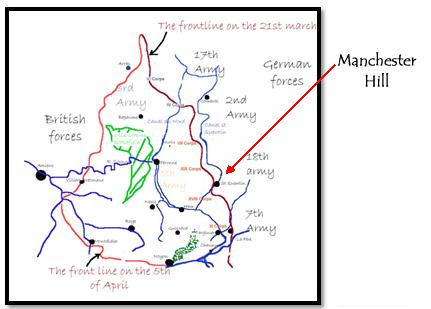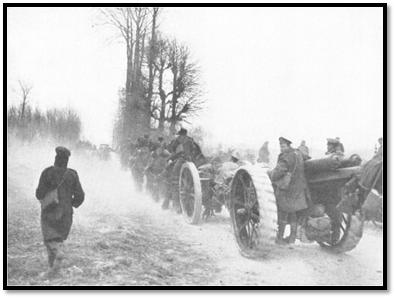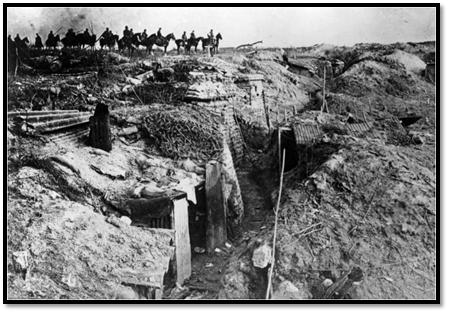


Manchester Hill Resources
Manchester Hill: The Last German Offensive
The Last German Offensive of the First World War
MANCHESTER HILL
So, what happened at Manchester Hill?
At the end of 1917 the German High Command found itself in a particularly good situation. The October Revolution and the disintegration of the Russian Army meant that the Germans could concentrate their forces on the Western Front, which was where the main fighting had occurred during the First World War.
Ludendorff (the German General) began to prepare a massive and, what he hoped would be, a decisive attack to be launched the following spring before the American Army was able to exploit its full potential. The offensive would be directed at the British Army which the German strategists considered to be exhausted after fighting four bloody and fruitless offensives in the course of 1917 at Arras, Messines, Passchendaele and Cambrai.
Why was it called "Manchester Hill"
It was called Manchester Hill because this piece of land had been captured by the 2nd Battalion Manchester Regiment in 1917. Wilfred Owen, the famous World War 1 poet was in this battalion and wrote his famous poem "Spring Offensive" about the capture of Manchester Hill.
What is an "offensive"
An offensive is an aggressive military operation usually aimed at an enemy force. It is also called an attack, an advance or an invasion. An offensive can be carried out on land, at sea or in the air. A common goal of an offensive is to engage the enemy in a battle. It can also be used to get an enemy to withdraw and avoid a battle.
What happened next?
Major offensives are not held over the winter….far better to wait for the spring when the lighter days and better weather are likely to aid the attacker.
So, it was that Day 1 of the offensive started on 21st March 1918. The last great battle of the First World War started when three German Armies struck a massive blow against the weak divisions of the British 3rd and 5th Armies. The first day of the Kaiserschlacht (The Kaiser’s Battle) began as a series of attacks that had been planned to break the deadlock on the Western Front, knock the British Army out of the war and finally bring victory to Imperial Germany.

Who was the Kaiser?
The Kaiser was Wilhelm II (or William II). He was the last King (Kaiser) of Prussia and ruled the German Empire and the Kingdom of Prussia. He was also the eldest grandchild of Queen Victoria.
What are the details of this offensive?
The first part of the offensive, was called Operation Michael, and it was expected to breach the British front at Arras, then the German army was to head north to cut off their railway supply lines. This would, the Germans hoped, allow them to envelop the British forces and secure their surrender. The section of land chosen for the offensive had recently been taken over by the British at the request of the French.
The line left by the French was discovered to be poorly defended and the British had to greatly improve its fortifications. These works had barely started when the Germans struck. To make matters worse, the British Army was going through a difficult period marked by a noticeable reduction in reinforcements (men) and a serious fall in morale after the heavy losses at the Third Battle of Ypres and the Battle of Cambrai.
Operation Michael came as a complete surprise to the British troops who took the brunt of its violence. The Germans used their larger number of troops (fifty-eight divisions against sixteen) to great effect and the Germans created a wide breach in the British front in the space of a few hours. Several divisions of troops were literally destroyed, such as the Irish 16th, the 36th and the 66th. Those units which were not dislocated made a fighting retreat through increasing chaos, congested roads and German artillery. This all added to the general panic.

Amiens soon came under threat and this forced the British to field large numbers of reserve troops to fill the breach.
Who was at Manchester Hill and when did this happened?
The 16th Battalion Manchester Regiment, led by Lieutenant Colonel Wilfrith Elstob were located at Manchester Hill, near St Quentin, France. By mid-March 1918 the British had been expecting a German attack. The 16th Battalion was ordered to defend their position and Elstob made it clear to his men that they would be resisting a large attack and that they must defend the position 'to the last round and to the last man'.
The attack came at around 6:30am on the 21st March. The Germans heavily shelled the Hill and then launched an infantry attack that was hidden by thick fog. By 11:30am the Germans had broken through and the Hill was surrounded. Lt. Col. Elstob kept moving from position to position, encouraging his men to keep fighting. At one point he held a position alone, using hand grenades and his revolver to drive off German attacks
How did it end?
A large German attack was launched during the afternoon and Lt. Col. Elstob helped to drive it off, using one of his soldier's rifles. He was slightly wounded during this fighting, but kept encouraging his men and ignoring the German fire. As he told them: 'You are doing magnificently boys!' Lt. Col. Elstob was wounded at least 3 more times, once by the explosion of a shell that blew him off his feet and 5 yards through the air. He took part in the hand to hand fighting that followed the final German assault at 3:30pm, and was finally shot dead when he was throwing grenades at the attackers. The surviving members of the 16th Battalion surrendered at around 4:00pm. The survivors became prisoners, and the Germans finally captured Manchester Hill.
Eventually, the German advance began to slow after a few days because of logistical problems (supplies of munitions and food for the troops were insufficient) and the increasing resistance of the Allies. Slowly but surely the German's initial and spectacular success began to flounder.

Was this event considered a success?
Manchester Hill was considered one of the most valiant defences by the British Army. The 16th Battalion, Manchester Regiment fought to the death to defend Manchester Hill against impossible odds.
Newspaper cutting of the day - Manchester Evening News 15th April 1918
Perhaps the story of the Manchester Regiment, 16th Battalion's stoic defence is best told by a newspaper article of the time. From The Manchester Evening News on Mon 15th April 1918 on the occasion of a commemorative service held at Manchester Cathedral to mark their valour.


